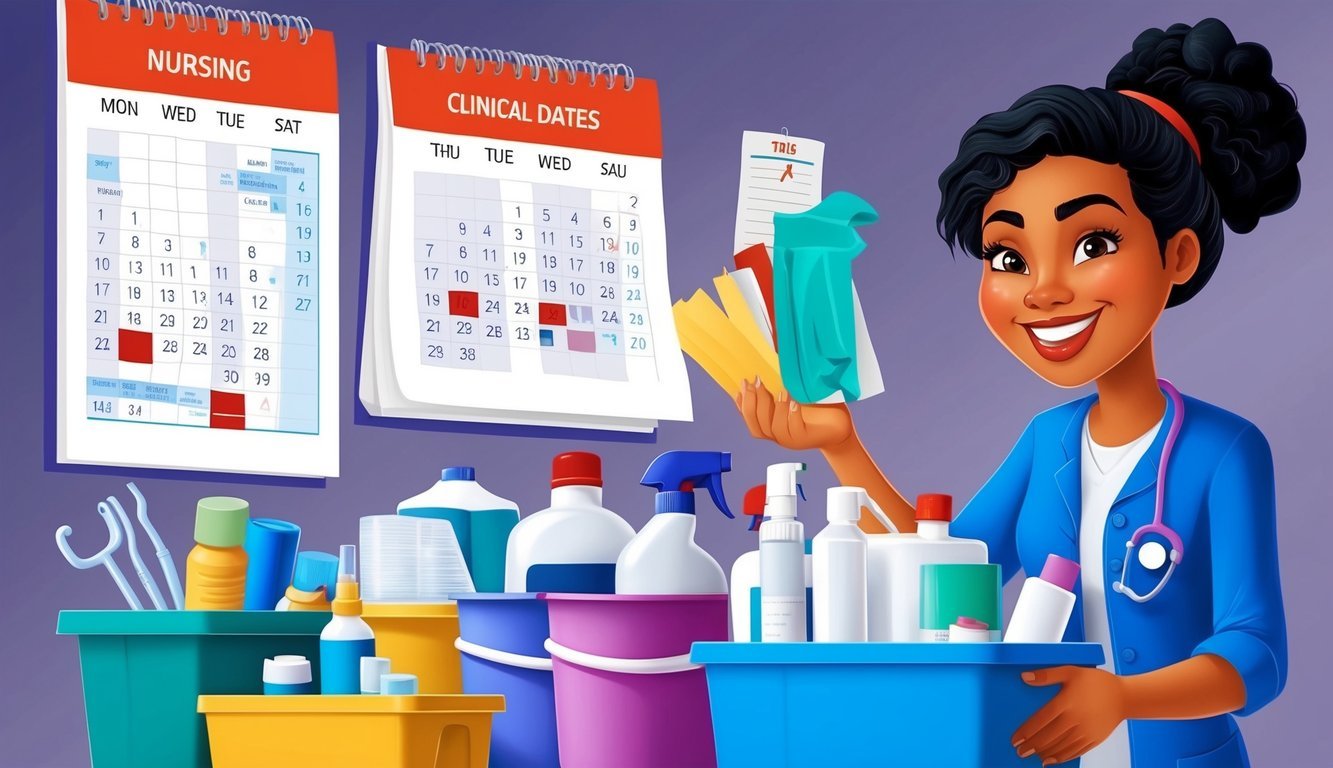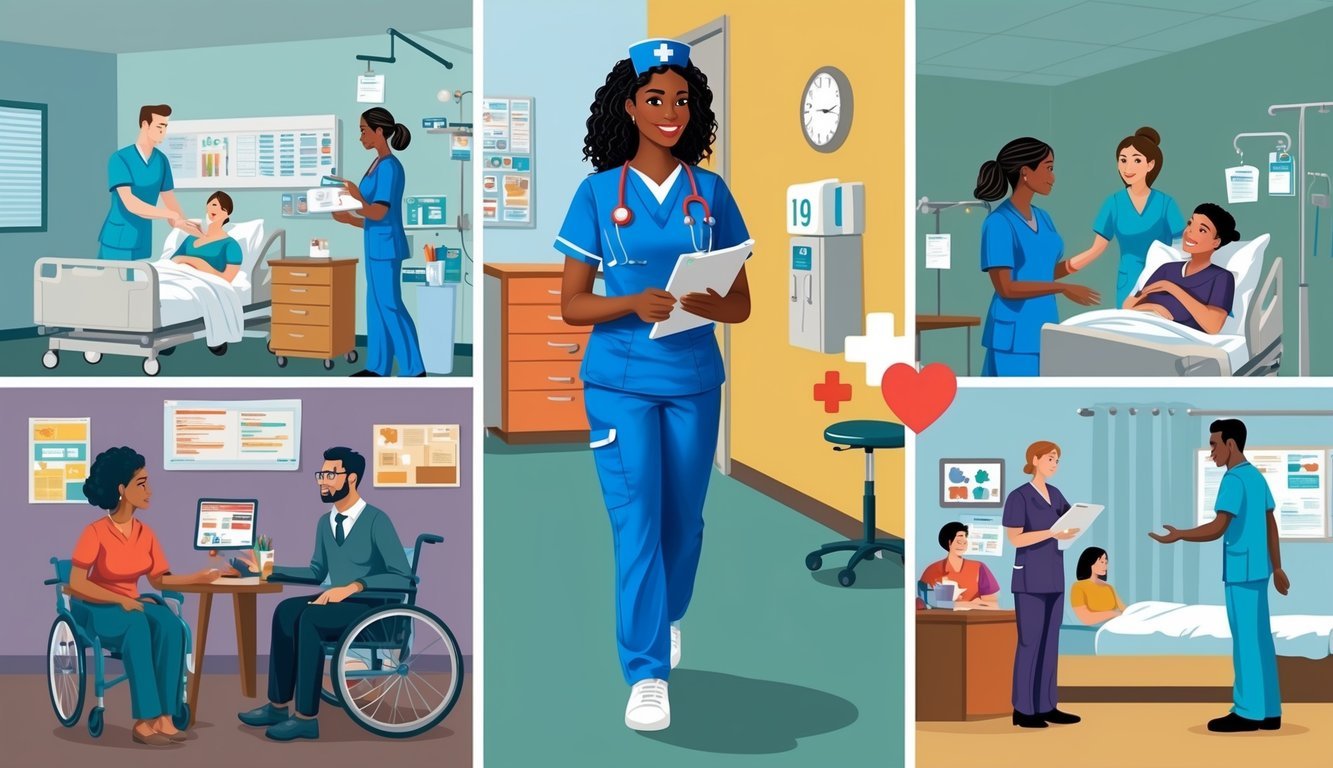Nursing clinicals are a vital part of your education as a nursing student.
These experiences allow you to apply what you’ve learned in the classroom to real-life settings, providing essential hands-on experience in patient care.
Typically, nursing clinicals last anywhere from four to twelve weeks, with shifts ranging from four to twelve hours each.
This structure helps you understand complex patient needs while working under the guidance of seasoned professionals.
As you embark on your clinical journey, you’ll encounter various healthcare environments, each with its own unique challenges and learning opportunities.
Being prepared for these settings is crucial, as it enhances your professional development and builds your confidence in delivering quality care.
You’ll find that the knowledge and skills gained during this time are invaluable for your future nursing career.
Key Takeaways
- Nursing clinicals usually last from four to twelve weeks.
- Students gain hands-on experience in various healthcare environments.
- Effective preparation is key to maximizing learning during clinicals.
The Structure of Nursing Clinicals

Nursing clinicals are an essential part of your education, providing hands-on experience in real healthcare settings.
Understanding their structure, including the clinical rotations and scheduling, can help you better prepare for this critical phase of your nursing training.
Clinical Rotations
During nursing school, you will participate in clinical rotations that allow you to apply your theoretical knowledge in practice.
These rotations take place in various healthcare environments such as hospitals, clinics, and long-term care facilities.
You will work under the supervision of experienced Registered Nurses (RNs) or clinical instructors.
This experience is vital to developing your skills in patient care, communication, and teamwork.
Each rotation focuses on a specific area of nursing, such as pediatrics, geriatrics, or obstetrics.
This variety prepares you for the diverse challenges you will face in your nursing career.
The goal is to give you practical exposure to different specialties, enhancing both your confidence and competence.
Duration and Scheduling
The duration and scheduling of nursing clinicals can vary based on your program.
Typically, clinical placements consist of 4 to 12-hour shifts spread over a series of weeks.
Here’s a general overview of scheduling:
| Duration | Shift Length | Frequency |
|---|---|---|
| 4-6 weeks | 8-12 hours | 2-4 shifts per week |
| 8-12 weeks | 4-8 hours | 1-3 shifts per week |
Most programs require a total of 300-500 clinical hours, depending on the level of nursing education you are pursuing.
It’s essential to be prepared for the commitment, as you will need to juggle these hours alongside classroom studies.
For more detailed insights, you can visit resources such as What to Expect During Nursing Clinicals or Nursing Clinicals – What to Expect & How to Prepare.
Preparation and Expectations for Students

Being well-prepared for nursing clinicals is essential to succeed.
Understanding your roles and responsibilities during this hands-on experience will enhance your learning and build your confidence in patient care.
Pre-Clinical Requirements
Before starting your clinical rotation, there are several pre-clinical requirements you need to fulfill.
These might include submitting immunization records, completing background checks, and obtaining CPR certification.
Additionally, you will need to have specific textbooks and materials, as these will support your understanding of the nursing process in real-world scenarios.
Lastly, you will often attend orientation sessions led by your clinical instructor.
This is your chance to learn about policies, procedures, and expectations regarding attendance and participation.
Roles and Responsibilities
During your clinicals, you will take on various responsibilities.
Your main role will be to assist nurses and healthcare staff in providing patient care.
This may involve tasks like taking vital signs, helping with daily activities, and documenting patient information.
It’s vital to actively participate during your shifts.
Being engaged shows your commitment to learning and improves your skills.
Regular attendance is also crucial.
Missing days can hinder your progression and affect your grade.
Be sure to communicate openly with your clinical instructor about any questions or concerns.
Their guidance is key as you navigate your clinical experience and deepen your understanding of nursing practices, including the nursing process.
For more information on what’s expected, you can check out resources like ANA or Nurse.org.
Clinical Skills and Patient Care
In nursing clinicals, you will focus on essential skills that are crucial for providing effective patient care.
This section explores fundamental nursing skills, specialized clinical settings, and the process of developing a nursing care plan.
Fundamental Nursing Skills
Fundamental nursing skills are the foundation of your practice.
These skills include patient assessment, administering medications, and providing hands-on patient care.
You will learn to measure vital signs, which include temperature, pulse, respiration, and blood pressure.
Accurate measurements are critical in assessing a patient’s health status.
Basic skills also involve understanding hygiene practices, such as bathing patients and managing catheters.
Practicing these skills during clinicals allows you to become comfortable and efficient in real-life situations.
Understanding the importance of documentation in patient care will also be emphasized.
You will need to chart findings accurately and follow protocols closely to ensure quality care.
Specialized Clinical Settings
In specialized clinical settings, you will apply your fundamental skills in environments such as hospitals, long-term care facilities, and community health centers.
Each setting presents unique patient needs.
For example, in a hospital, you might care for surgical patients, while in a long-term care facility, you may focus on ongoing health changes for residents.
You will work closely under the supervision of a registered nurse (RN) instructor.
This mentorship helps you develop your skills and understand the workflows specific to each environment.
Every specialized area has distinct practices, so being adaptable is key.
You will gain exposure to various patient care protocols that enhance your clinical experience and understanding.
Developing a Nursing Care Plan
Creating a nursing care plan is crucial for providing structured and effective care.
It starts with a thorough patient assessment to identify specific health needs.
A care plan typically includes the following components:
- Patient diagnosis: Determine the health issue.
- Goals: Set measurable and achievable goals for recovery.
- Interventions: Identify actions to address the patient’s needs.
- Evaluation: Measure the effectiveness of these actions.
You will learn to collaborate with healthcare teams to develop comprehensive care plans tailored to individual patients.
This skill is essential for improving patient outcomes and ensuring continuity of care. Learn more about care planning.
Through hands-on experiences, you will strengthen your ability to create, implement, and adjust nursing care plans based on patient responses.
Professional Development during Clinicals

During your nursing clinicals, you have valuable opportunities for professional growth.
You will gain insight from clinical instructors, receive feedback to enhance your skills, and improve your interpersonal communication.
Learning from Clinical Instructors
Your clinical instructor plays a crucial role in your learning.
They are often experienced nurses who guide you through real situations.
This mentorship allows you to see how theory applies to practice.
Instructors provide demonstrations of patient care techniques.
Watching them can enhance your critical thinking skills as you analyze their decision-making processes.
You also gain exposure to various nursing roles, from direct patient care to administrative tasks.
Building a rapport with your instructor can lead to personalized learning experiences.
Their insights can shape your nursing practice, helping you develop a strong foundation for your career.
Feedback and Improvement
Feedback is essential for your growth during clinicals.
Constructive criticism from your clinical instructor helps you identify areas for improvement.
It guides your actions and decisions in patient care.
After each shift, discuss your performance with your instructor.
Ask specific questions about your clinical skills, such as assessment techniques and communication with patients.
This feedback can refine your approach and boost your confidence.
Setting personal goals based on this feedback allows you to track your progress.
Ensure you are receptive to suggestions, as they are vital for your development as a nurse.
Interpersonal Skills and Communication
Developing strong interpersonal skills is vital in nursing.
Clinicals provide a hands-on environment to practice communication with patients, families, and healthcare teams.
Effective communication helps you gather patient information accurately.
It also enables you to provide emotional support when needed.
Practicing active listening enhances your relationships with patients and colleagues.
Additionally, teamwork is essential in healthcare settings.
Learning to collaborate with other professionals improves patient outcomes.
Engage in discussions with your peers to build relationships and enhance your overall communication abilities.
Navigating Different Clinical Environments

Understanding various clinical environments is essential for your nursing education.
Each setting provides unique experiences and challenges that help you develop your skills and knowledge.
Acute and Long-Term Care
In acute care settings, such as hospitals, you work with patients who need immediate medical attention.
This environment is fast-paced and often involves critical care.
You’ll assist in monitoring vital signs, administering medications, and participating in emergency procedures.
In contrast, long-term care facilities focus on patients with chronic illnesses or disabilities.
Here, you may work with older adults and those in need of rehabilitation.
Your tasks include administering daily medications and helping with daily activities like bathing or dressing.
Both settings require strong communication skills and a compassionate approach to patient care.
Specialty Areas of Nursing
Specialty areas of nursing include fields such as pediatrics, geriatrics, and critical care.
Each specialty requires specific knowledge and skills.
In pediatrics, you care for infants, children, and adolescents.
You’ll gain experience in child development and communication techniques suited for younger patients.
This area emphasizes a gentle approach, as many children may be fearful in medical settings.
Geriatrics focuses on older patients.
You will learn about age-related health issues and how to address them compassionately.
This experience will help you develop patience and understanding, which are crucial in this specialized field.
Community Health and Home Care
In community health, your focus is on improving the health of populations.
You may engage in health education, disease prevention, and outreach programs.
This role often involves working directly with communities at risk.
Home care provides another vital nursing experience.
You will work with patients in their homes, managing chronic conditions and recovery processes.
This setting requires strong organizational skills and the ability to work independently.
Building relationships is key, as you often become a trusted caregiver for your patients.
Each environment offers valuable lessons that will shape your nursing career.
These experiences allow you to understand different patient needs and tailor your care approaches accordingly.
Frequently Asked Questions

You may have several questions about nursing clinicals, including their duration, frequency, and other important details.
Below are answers to some common queries about clinical placements in nursing programs.
What is the typical duration of clinical rotations in nursing programs?
Clinical rotations usually last between 4 to 12 weeks, depending on the specific nursing program.
Each rotation may include several shifts to ensure you gain enough hands-on experience.
How often do nursing students have clinical rotations each week?
Most nursing students participate in clinical rotations 1 to 3 times per week.
The frequency can vary based on the program’s structure and your specific schedule.
At which point in their education do nursing students usually begin clinical placements?
Nursing students typically start their clinical placements during the second semester of their program.
This timing allows you to apply foundational knowledge gained in earlier courses.
What is the total number of clinical hours required for completion of a nursing degree?
The total number of clinical hours needed varies by program but often ranges from 600 to 1,200 hours.
These hours are essential for hands-on experience required to meet certification standards.
Is compensation provided to nursing students during their clinical rotations?
No, nursing students generally do not receive compensation for their clinical rotations.
These placements are considered a part of the educational process.
What challenges do nursing students face during evening or night clinical shifts?
Nursing students face challenges during evening or night shifts.
These include fatigue and difficulty managing personal schedules.
You may also find it harder to collaborate with other healthcare staff who work during the day.

